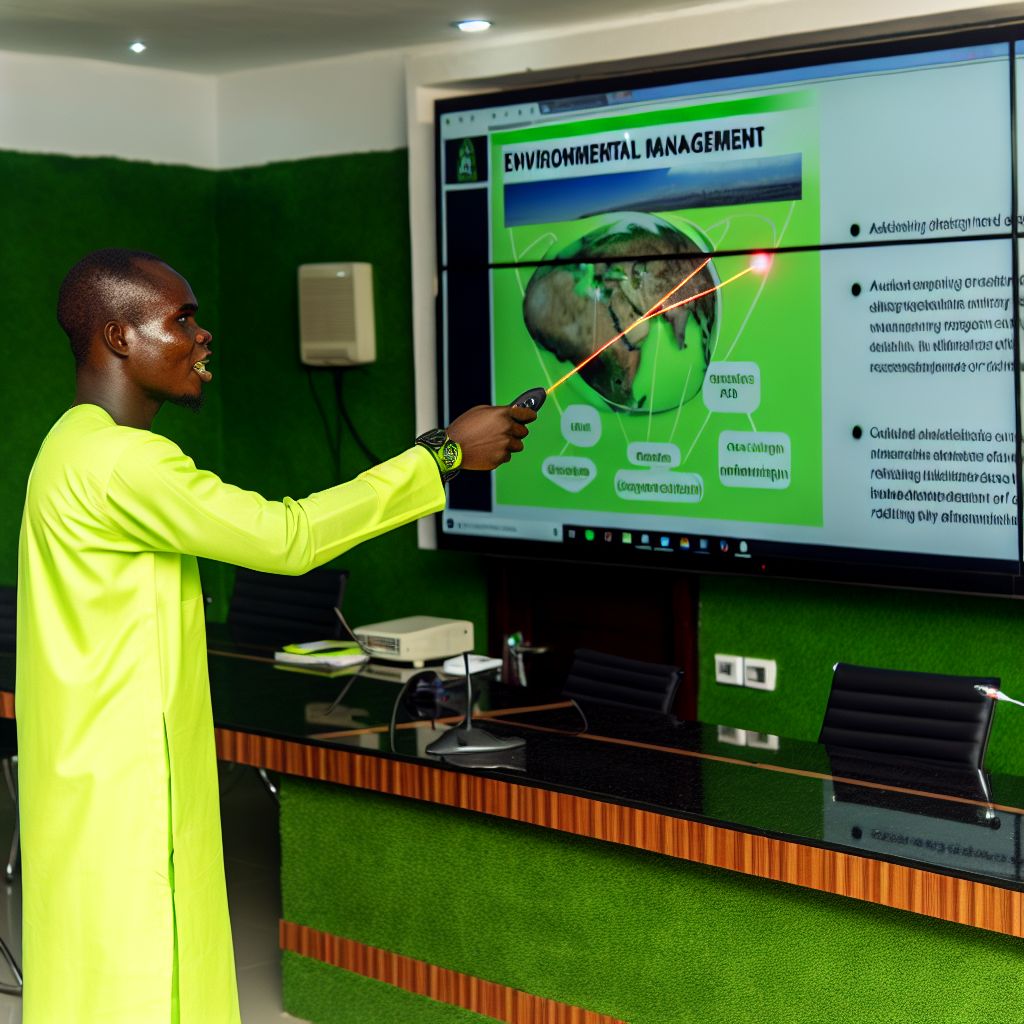Introduction:
Nigerian NGOs play a crucial role in addressing environmental management technology within the country.
These organizations focus on implementing sustainable practices to combat the growing environmental issues facing Nigeria.
Brief Overview of Nigerian NGOs in Environmental Management Technology:
Nigerian NGOs are actively involved in promoting environmental conservation, waste management, and renewable energy solutions.
They work closely with local communities and government agencies to develop strategies for sustainable development.
Importance of NGOs in Addressing Environmental Issues in Nigeria:
NGOs provide valuable resources and expertise in identifying environmental challenges and implementing innovative solutions.
Their efforts help raise awareness, educate the public, and advocate for policies that protect the environment.
Overview of Environmental Challenges in Nigeria:
Nigeria, like many other countries, faces a myriad of environmental challenges that require urgent attention and intervention.
These challenges pose a significant threat to the health and well-being of the population, as well as to the sustainability of natural resources and ecosystems.
Major Environmental Challenges Facing Nigeria:
-
Deforestation: The rampant cutting down of trees for agriculture, logging, and urban development has led to deforestation, causing soil erosion, loss of biodiversity, and disruption of ecosystems.
-
Water Pollution: Pollution from industrial waste, agricultural runoff, and inadequate waste management practices has contaminated water sources, leading to health issues and water scarcity.
-
Air Pollution: Emissions from vehicles, industries, and open burning contribute to poor air quality, respiratory diseases, and climate change.
-
Oil Spills: Nigeria’s oil-rich Niger Delta region has experienced numerous oil spills that have devastated the environment, aquatic life, and livelihoods of local communities.
-
Waste Management: Inadequate waste disposal facilities and poor waste management practices have resulted in overflowing landfills, pollution of water bodies, and health hazards.
Role of NGOs in Addressing Environmental Challenges:
Non-Governmental Organizations (NGOs) play a crucial role in addressing environmental challenges in Nigeria by raising awareness, implementing sustainable solutions, and advocating for policy reform.
These organizations work on the ground to engage with communities, collaborate with government agencies, and mobilize resources to support environmental conservation efforts.
Statistics or Data to Support Severity of Environmental Issues:
-
According to the World Health Organization (WHO), air pollution in Nigeria is responsible for over 150,000 deaths annually.
-
In 2019, Nigeria ranked 14th out of 180 countries on the Environmental Performance Index, indicating poor environmental quality and sustainability.
-
A study by the United Nations Development Programme (UNDP) found that deforestation rates in Nigeria are among the highest in the world, with an estimated loss of 3.7% of forest area annually.
-
The United Nations Environment Programme (UNEP) estimates that over 800,000 tons of plastic waste are generated in Nigeria each year, with only a fraction being recycled or properly disposed of.
Specific Projects and Initiatives
Nigerian NGOs have been actively involved in various environmental management technology projects.
One notable initiative is the tree planting campaign aimed at increasing green cover in urban areas.
Success Stories of NGOs
NGOs such as the Nigerian Conservation Foundation (NCF) have made significant strides in protecting biodiversity through community-based conservation projects.
They have successfully restored degraded ecosystems and habitats.
Importance of Technology
Technology plays a crucial role in enhancing environmental management efforts.
From satellite imagery for monitoring deforestation to GIS mapping for resource planning, technology provides valuable tools for sustainable development.
NGOs like Health of Mother Earth Foundation (HOMEF) utilize drones to survey and document environmental degradation, creating data-driven solutions for conservation.
Collaboration and Partnerships
NGOs often collaborate with government agencies, academic institutions, and international organizations to leverage expertise and resources for environmental projects.
Partnerships with technology companies also enable NGOs to access cutting-edge tools for monitoring and evaluation.
Capacity Building and Training
NGOs in Nigeria organize workshops and training programs to build local capacity in environmental management technology.
These initiatives empower communities to address environmental challenges using innovative solutions.
Community Engagement
NGOs engage communities through awareness campaigns and participatory projects that promote sustainable practices.
By involving community members in decision-making processes, NGOs foster a sense of ownership and responsibility for environmental conservation.
Policy Advocacy and Implementation
NGOs play a vital role in advocating for sound environmental policies and regulations.
They work closely with government agencies to influence decision-making and ensure the effective implementation of environmental laws.
Challenges and Way Forward
Despite their successes, Nigerian NGOs face challenges such as limited funding, inadequate infrastructure, and regulatory constraints.
To overcome these obstacles, there is a need for greater collaboration, capacity building, and resource mobilization.
Nigerian NGOs play a crucial role in environmental management technology by implementing innovative projects, leveraging technology for conservation efforts, and advocating for sustainable policies.
Through partnerships, community engagement, and capacity building, these NGOs continue to make a positive impact on the environment in Nigeria.
Uncover the Details: Top Environmental Biology Research Centers
Collaboration with Government and International Organizations:
Explore partnerships between Nigerian NGOs, government agencies, and international organizations.
Highlight the benefits of collaboration for effective environmental management.
Provide examples of successful partnerships and their outcomes.
Partnerships between Nigerian NGOs, Government Agencies, and International Organizations
Collaboration between Nigerian NGOs, government agencies, and international organizations is essential in addressing environmental issues effectively.
By working together, these entities can pool resources, expertise, and networks to achieve sustainable environmental management goals.
Nigerian NGOs play a crucial role in raising awareness, conducting research, and implementing projects to mitigate environmental challenges.
Government agencies, on the other hand, have the power to enforce regulations, allocate funds, and set policies to protect the environment.
International organizations bring in global best practices, funding, and technical assistance to support environmental initiatives.
Benefits of Collaboration for Effective Environmental Management
Enhanced Impact: Collaboration allows for a more comprehensive approach to addressing environmental issues, leading to a greater impact on the ground.
Resource Sharing: Partnering with government agencies and international organizations enables Nigerian NGOs to access additional resources such as funding, equipment, and expertise.
Transform Your Career with Expert Guidance
Get personalized mentorship consulting that’s tailored to your unique path. Our expert advice is actionable and exclusive.
Get StartedKnowledge Exchange: Collaboration facilitates the sharing of best practices, research findings, and innovative solutions to environmental challenges.
Policy Influence: By working together, NGOs, government agencies, and international organizations can advocate for policies that promote sustainable environmental management.
Examples of Successful Partnerships and Their Outcomes
- Partnership between an NGO, the Ministry of Environment, and the United Nations: This collaboration led to the implementation of a waste recycling program in a Nigerian city, reducing landfill waste by 30% within a year.
- Collaboration between a local environmental NGO, a government research institution, and a global conservation organization: The partnership resulted in the establishment of a marine protected area, safeguarding critical habitats and biodiversity.
- Joint initiative between a youth-led NGO, the National Environmental Standards and Regulations Enforcement Agency (NESREA), and the World Wildlife Fund: The project focused on tree planting and community education, resulting in reforestation and improved environmental awareness.
Collaboration between Nigerian NGOs, government agencies, and international organizations is crucial for effective environmental management.
By leveraging each other’s strengths and resources, these partnerships can drive sustainable solutions to protect and preserve Nigeria’s natural resources for future generations.
Learn More: Conservation Projects Led by Nigerian Scientists
Challenges Faced by Nigerian NGOs
- Identify common challenges faced by NGOs in environmental management technology.
- Discuss barriers to success, such as funding constraints and regulatory issues.
- Offer potential solutions to overcome these challenges.
Non-governmental organizations (NGOs) in Nigeria that focus on environmental management technology face a myriad of challenges.
These challenges hinder their ability to effectively carry out their missions and achieve their goals.
In this section, we will delve into some of the common obstacles faced by Nigerian NGOs in the field of environmental management technology.
Lack of Funding
One of the most significant challenges facing Nigerian NGOs in environmental management technology is the lack of adequate funding.
Without sufficient financial resources, these organizations struggle to implement projects, conduct research, and hire qualified staff.
This constraint limits their impact and hampers their ability to address pressing environmental issues.
To overcome this challenge, NGOs can explore various funding sources such as grants, partnerships with corporate entities, and individual donations.
Additionally, they can work on building strong relationships with donors and showcasing the positive impact of their work to attract more funding opportunities.
Regulatory Issues
Another common challenge for Nigerian NGOs is navigating regulatory issues related to environmental management technology.
The complex and often ambiguous regulatory environment in the country can create barriers to success for these organizations.
Compliance with regulations can be costly and time-consuming, diverting resources away from core activities.
To address regulatory challenges, NGOs can engage in advocacy efforts to influence policy development and implementation.
Collaborating with government agencies, other NGOs, and industry stakeholders can help create a more supportive regulatory framework for environmental initiatives.
By actively participating in the policy-making process, NGOs can shape regulations that are conducive to their work.
Lack of Technical Expertise
Many Nigerian NGOs struggle with a lack of technical expertise in environmental management technology.
The complexities of modern environmental challenges require specialized knowledge and skills, which may not always be readily available within the organization.
Without technical expertise, NGOs may struggle to design and implement effective solutions to environmental issues.
To overcome this challenge, NGOs can invest in capacity building initiatives to train their staff and volunteers in relevant technical skills.
They can also forge partnerships with research institutions, universities, and experts in the field to access specialized knowledge.
By building a network of technical experts, NGOs can enhance their capabilities in environmental management technology.
Limited Public Awareness
Nigerian NGOs often face the challenge of limited public awareness about environmental issues and the role these organizations play in addressing them.
Without widespread support and engagement from the public, NGOs may struggle to mobilize resources, attract volunteers, and advocate for policy change.
This lack of awareness can impede their ability to achieve their objectives.
To address this challenge, NGOs can focus on increasing public awareness through educational campaigns, outreach activities, and media engagements.
By raising awareness about environmental issues and the work of NGOs, they can garner public support and participation.
Building partnerships with media outlets and influencers can help amplify their message and reach a wider audience.
Inadequate Infrastructure
Infrastructure challenges, such as unreliable electricity, limited internet connectivity, and inadequate office space, can hinder the operations of Nigerian NGOs in environmental management technology.
Without proper infrastructure, organizations may struggle to communicate effectively, access information, and collaborate with stakeholders.
To mitigate infrastructure challenges, NGOs can invest in backup power sources, such as generators or solar panels, to ensure uninterrupted operations.
They can also leverage digital tools and platforms for remote collaboration and information sharing.
Building resilient infrastructure will enhance the efficiency and effectiveness of their environmental initiatives.
Delve into the Subject: Overview of Environmental Biology in Nigeria

Empowering Local Communities:
Nigerian NGOs play a crucial role in empowering local communities in environmental conservation through various initiatives and programs.
These organizations work closely with community members to raise awareness, build capacity, and foster sustainable practices.
Engagement with Local Communities:
- Nigerian NGOs engage local communities by conducting workshops, seminars, and training sessions on environmental issues.
- These organizations collaborate with community leaders to develop action plans for sustainable environmental management.
- Through community outreach programs, NGOs educate residents on waste management, recycling, and renewable energy technologies.
Impact of Community-Based Initiatives:
- Community-based initiatives have had a significant impact on sustainable development in Nigeria.
- By involving local communities in environmental conservation efforts, NGOs have seen positive changes in resource management.
- Projects such as tree planting campaigns, clean-up drives, and water conservation schemes have improved the overall environmental quality.
Importance of Community Involvement:
- Community involvement is essential for the success of environmental management projects.
- Local residents have valuable knowledge about their environment and can contribute to decision-making processes.
- Empowering communities to take ownership of conservation efforts leads to long-term sustainability and positive outcomes.
You Might Also Like: Nigerian Fisheries and Marine Biology Research
Crucial Role of Nigerian NGOs in Environmental Management
Nigerian NGOs are instrumental in driving positive change towards environmental sustainability through various initiatives and projects.
They serve as watchdogs, educators, and catalysts for action in promoting responsible environmental practices and policies.
Their commitment to preserving the environment and ensuring a healthier planet for all cannot be overstate.
Support for Nigerian NGOs Working Towards a Greener Nigeria
We urge you to support Nigerian NGOs in their efforts to protect the environment by volunteering, donating, or spreading awareness about their causes.
Get involved in local environmental projects, advocate for sustainable practices, and be a part of the solution to create a cleaner and greener Nigeria.
Your support can make a significant impact and contribute to a more sustainable future for Nigeria and the planet as a whole.




